World of film opens wide at AFM
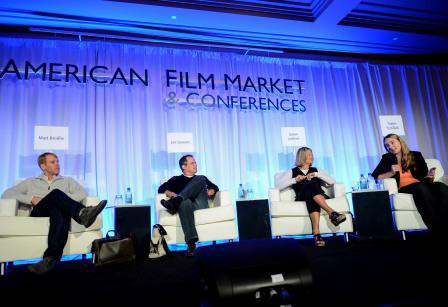
“Conquering the American Film Market”
A dynamic labyrinth of talent and opportunity, the AFM can be overwhelming to navigate for neophytes. A veteran attendee offers guidance to green filmmakers who are otherwise game.
by Robin Christian
~~~~~
Each year, the American Film Market (AFM) attracts tens of thousands of film industry professionals from all around the world to Santa Monica, California. I say professionals; however, not unlike the millions of actors and actresses who wait tables while awaiting their next role in a feature or on television, some of us producers, directors, writers, composers, costume designers, and so on are doing film business on the side while holding down other jobs. For those of you falling in this category, I can offer a glimpse into the exciting industry you hope to someday conquer through my experiences attending AFM.
Thousands of little meetings take place in the suites and hotel rooms, converted into mini-offices, of the Loews Santa Monica Beach Hotel and surrounding beachfront venues. Some may be about a single film, others might cover a slate of projects. It appears AFM has become the “go-to” indicator, or barometer, for sensing the pulse of the entire entertainment industry. (This excludes the major film studios, an industry unto themselves.) If movies sell poorly or attendance is up at AFM, the trades such as Variety or The Hollywood Reporter document it as a positive or negative reflection of the independent movie business as a whole.
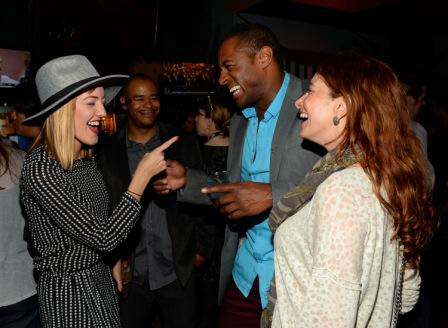
Film buyers trek to AFM to make deals. Each day after the nightly cocktail parties they take shuttle buses from screening to screening, presented in area cinemas closed to the general public. The buyers then visit those temporary offices, inhabited by distributors or sales agents representing the films, to purchase rights for content they are interested in. The purchase, or license, typically lasts from three to seven years. The films will appear on television, in theaters, on-line, and on DVD or Blu-ray in the country or countries represented by the buyer.
For the filmmaker not yet dialed in to this marketplace, AFM is a vital resource in numerous ways. Over the course of the event, lasting a week or more each November, attendees can meet hundreds of individuals who will do absolutely nothing for their projects or careers and then run into that one person who could change their lives. I try to go every year for at least six days and I learn something new while gaining valuable contacts each time.
AFM is the biggest networking opportunity for independent filmmakers because, at any given moment, you could be sitting next to a distributor or acquisition director who might pick up your film or find finishing funds for it. If you are in the early stages of development or pre-production, AFM teems with potential actors and crew members you might interest in helping finish your project. Odds like these can’t be found anywhere else in the world! That said, against my own common sense, I went to the 2013 AFM without a pass allowing me access to the meeting rooms or related conferences. This turned out to be a huge mistake as I primarily sat on a beach deck overlooking the Santa Monica pier, making calls and hoping I’d run into people I needed to see.
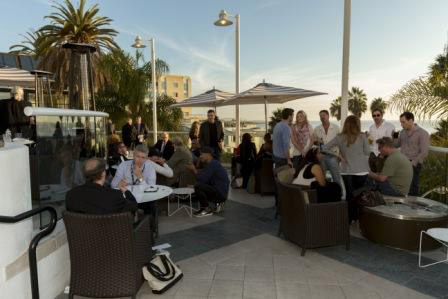
Although Steven Spielberg or James Cameron may not regularly attend, AFM provides many surprises of their caliber. The Weinstein brothers hold office there as does Avi Lerner, producer of THE EXPENDABLES and its sequels. Even actor-producers like George Clooney will stop by to take meetings and try to secure financing for upcoming projects. Last year, I saw Billy Zane standing outside as he awaited a meeting. I’m not starstruck, and acting the fan is never a good idea, but it’s kind of cool standing next to a star from TOMBSTONE and TITANIC while doing business. If you really feel the need to approach a celebrity in such a situation, I suggest saying to him or her, “I really admire your body of work.” You’re a filmmaker and that’s the respectful tone you need to project.
Have plenty of business cards if you attend AFM. Make sure to give a card to those involved in your conversation if more than one person is present. Conversely, you will receive business cards from people you have no need to contact again. I find it best to put cards for those I want to contact afterwards in one pocket and cards I don’t think I’ll ever need in another pocket. I also write quick notes on why I take a card, and possibly date it. That prevents confusion later on from looking through stacks of cards with no clue about what plan of action to take with the information. Don’t expect people to ever follow up with you; it’s your career, so you need to expend the sweat equity and follow through. Also, don’t ever take it personally if they say they will contact you and don’t. Life moves fast and the film industry moves at twice that speed!
Remember, just one contact you make can change your life forever. Also remember that not everybody wants to hear your pitch. I follow a strategy of holding back, acting nice, and being a good listener to everyone I meet. Their memory of me should be a positive one, not of “that guy who won’t leave me alone.” Don’t be shy, though, as you may miss a big opportunity by not saying, “Excuse me, ma’am!”

I recommend getting a one-day pass, at the least, so you can browse the meeting rooms at AFM. Don’t expect to be waited on immediately because those representatives are busy. They’ve rented space for thousands of dollars so that buyers – and not necessarily you, the filmmaker – can easily visit them. Using tools such as IMDbPro, research in advance these agents, their companies, and the producers of the films they represent. Do they specialize in certain genres? If they rep family movies with dogs, for instance, they might not want your martial arts action movie. I did observe at the 2013 AFM a large contingent of Hong Kong film people touting co-production opportunities throughout Asia, on the other hand.
My overall suggestion to you is, if you are really serious about this industry, attend the American Film Market beginning with this year’s show on November 5-12. Prior to going, read the aforementioned trades and IMDbPro so you are aware of hot trends, saleable genres, and key players who will be present. Make a list of people you want to meet, using AFM resources as your guide. No matter what type of film you make or need help with, do that homework and pick up additional study materials while at AFM to maximize your experience. As stated before, I leave the market with stacks of business cards and new knowledge of the industry learned from conversations, seminars, and observation. Then you will look up additional details before making follow-up calls to the people you met who can help you conquer Hollywood … or, maybe, just carve out a successful niche.
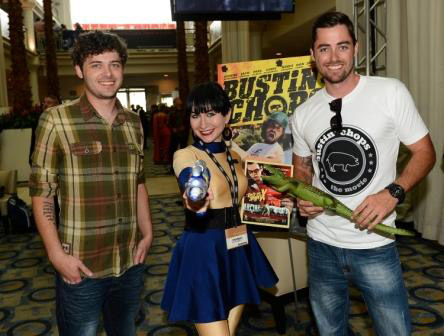
~~~~~
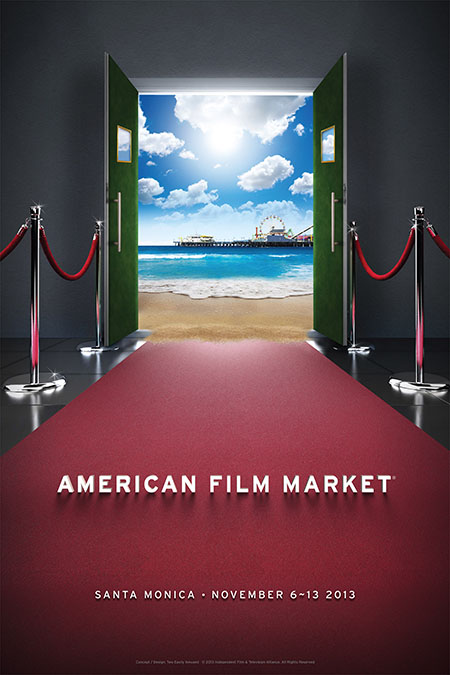
~~~~~
Robin Christian is an Illinois resident who travels between his offices in Champaign, IL, and Hollywood, CA. He is an award-winning independent filmmaker and can be reached at robin [at] dreamscape [dot] la.
Article © 2014 Robin Christian. Used with permission.
CUBlog edits © 2014 Jason Pankoke
AFM graphics: Mark Davis/Getty Images for AFM © 2013